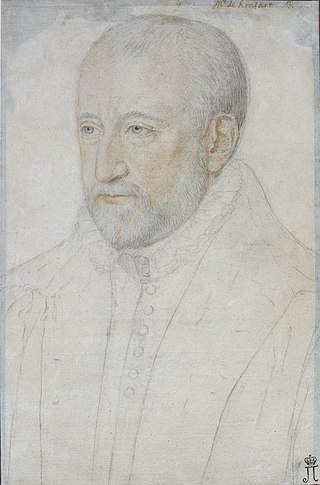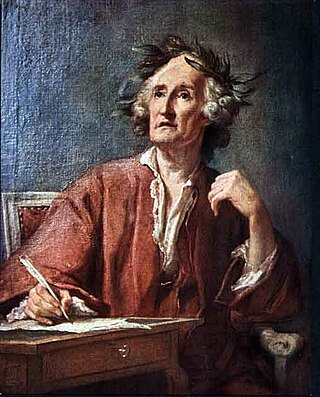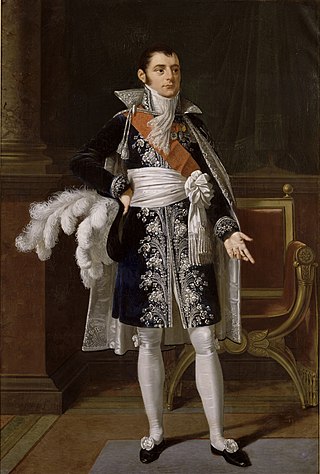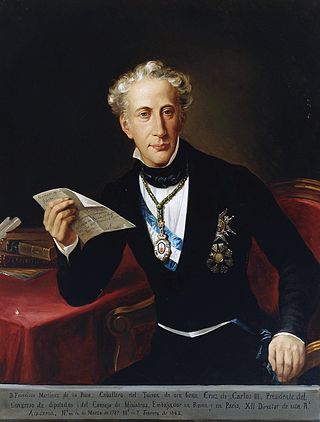
JoséZorrilla y Moral was a Spanish poet and dramatist,who became National Laureate.

Ferdinand VII was King of Spain during the early 19th century. He reigned briefly in 1808 and then again from 1813 to his death in 1833. Before 1813 he was known as el Deseado,and after,as el ReyFelón.

The Battle of Gamonal was fought on 10 November 1808,during the Peninsular War in the village of Gamonal,near Burgos,Spain. A French army under Soult overwhelmed the outnumbered Spanish troops under General Belvedere,opening central Spain,including Madrid,to invasion.

Pierre de Ronsard was a French poet or,as his own generation in France called him,a "prince of poets".

Ponce Denis Écouchard Lebrun was a French lyric poet.

Juan Ramón Jiménez Mantecón was a Spanish poet,a prolific writer who received the 1956 Nobel Prize in Literature "for his lyrical poetry,which in the Spanish language constitutes an example of high spirit and artistic purity". One of Jiménez's most important contributions to modern poetry was his advocacy of the concept of "pure poetry".

Francisco Gómez de Sandoval y Rojas,1st Duke of Lerma,5th Marquess of Denia,1st Count of Ampudia,was a favourite of Philip III of Spain,the first of the validos through whom the later Habsburg monarchs ruled. His administration was marked by costly wars,including the Twelve Years' Truce with the Dutch Republic,financial mismanagement,and the controversial expulsion of the Moriscos. Eventually,he was deposed in 1618 under a palace intrigue orchestrated by his son and political rival,Cristóbal de Sandoval. Lerma retired as a cardinal and was succeeded by the Count-Duke of Olivares but faced financial penalties and died in 1625 at Valladolid.

Anne Jean Marie RenéSavary,1st duc de Rovigo was a French military officer and diplomat who served in the French Revolutionary Wars,the Napoleonic Wars and the French invasion of Algeria. He was Minister of Police between 1810 and 1814.

Pierre-Antoine,comte Dupont de l'Étang was a French general of the French Revolutionary and Napoleonic Wars,as well as a political figure of the Bourbon Restoration.
Nicasio Álvarez de Cienfuegos was a Spanish poet and publicist.

The Battle of Somosierra took place on 30 November 1808,during the Peninsular War,when a combined Franco-Spanish-Polish force under the direct command of Napoleon Bonaparte forced a passage through a Spanish Division stationed at the Sierra de Guadarrama,which shielded Madrid from direct French attack. At the Somosierra mountain pass,60 miles (97 km) north of Madrid,a heavily outnumbered Spanish detachment of regulars,volunteers and artillery under Benito de San Juan aimed to block Napoleon's advance on the Spanish capital. Napoleon overwhelmed the Spanish positions in a combined arms attack,sending the Polish Chevau-légers of the Imperial Guard at the Spanish guns while French infantry advanced up the slopes. The victory removed the last obstacle barring the road to Madrid,which fell several days later.

Marshal Rémy Joseph Isidore Exelmans,1st Comte Exelmans was a distinguished French soldier of the Revolutionary and Napoleonic Wars,as well as a political figure of the following period.

Esteban Manuel de Villegas was a 17th-century Spanish poet.

Francisco de Paula Martínez de la Rosa y Cornejo was a Spanish statesman and dramatist and the first prime minister of Spain to receive the title of President of the Council of Ministers.

JoséMaría Queipo de Llano y Ruiz de Saravia,7th Count of Toreno,GE,was a nineteenth-century Spanish politician and historian,who was Prime Minister of Spain. In Spain,he is simply known as Conde de Toreno.
Romanticism arrived late and lasted only for a short but intense period,since in the second half of the 19th century it was supplanted by Realism,whose nature was antithetical to that of Romantic literature.

The Dos de Mayo or Second of May Uprising took place in Madrid,Spain,on 2–3 May 1808. The rebellion,mainly by civilians,with some isolated military action by junior officers,was against the occupation of the city by French troops,and was violently repressed by the French Imperial forces,with hundreds of public executions.
Spanish Enlightenment literature is the literature of Spain written during the Age of Enlightenment.

Manuel de Godoy y Álvarez de Faria Rios,1st Prince of the Peace,1st Duke of Alcudia,1st Duke of Sueca,1st Baron of Mascalbó,was the First Secretary of State of the Kingdom of Spain from 1792 to 1797 and then from 1801 to 1808,and as such,one of the central Spanish political figures during the rise of Napoleon and his invasion of Spain. Godoy came to power at a young age as the favourite of King Charles IV and Queen Maria Luisa. He has been partly blamed for the Anglo-Spanish War of 1796–1808 that brought an end to the Spanish Empire. Godoy's unmatched power ended in 1808 with the Tumult of Aranjuez,which forced him into a long exile,dying in Paris in 1851.

Julián Romea Yanguas was a Spanish theater actor and writer. He heads a theatrical dynasty that also includes his nephew Julián Romea Parra and his son Alberto Romea Catalina.

















